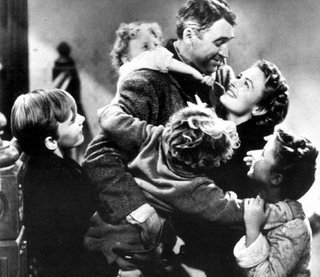The richest man in town

STIPIMM: “Hark the Herald Angels Sing”
As you may recall, I’ve been reading a hefty biography of the director Frank Capra. Very good read. I just finished the chapter that examines the time during which he made the classic It’s a Wonderful Life, one of my favorite of his movies.
According to the book, It’s a Wonderful Life (IAWL) was made at a turning point in Capra’s career. World War II had just ended, and the movie marked his return to Hollywood after making propaganda films for the Army. Before the war, Capra was coming off the peak of his career, which lasted from 1934, when he made It Happened One Night until 1939, when he made Mr. Smith Goes to Washington. Trying to get back into the swing of his career after the interruption of the war was tough for Capra; indeed, IAWL was the last great film he made. It wasn’t until I read this book that I realized how it represented not only the beginning of the end of Capra’s creative powers, but also his last coherent statement on the kinds of values that we today call “Capraesque.”
There were lots of reasons for this precipitous downfall: the Red Scare made Capra hesitant to make films that supported the “little guy;” Capra ended his partnership with his longtime collaborator, Robert Riskin (who wrote most of his best films of the 30s); he left Columbia, a smaller studio where he had a fair amount of freedom, for Paramount, where he had more resources, but less wiggle room. But fortunately, before his style became a parody of itself in the 50s and 60s, he made one last great film, one that will live on longer than any of his others.
But as I read about the movie, I kept asking myself, “Why do I love this movie so much?” It is, as the author of the biography contends, one of the sappiest pieces of supernatural fiction you’ll ever have the pleasure of seeing. On the believability scale, it falls somewhere between “A Christmas Carol” and “’Twas the Night Before Christmas.” The last 10 minutes pull on every known heartstring this side of a Hallmark card commercial.
And yet it works. It works exceptionally well. I cannot watch the ending of that movie, even if I haven’t watched the rest of the dang thing, without crying. No chance. Even if I fight it, the tears will well up without my consent. Hell, I don’t even have to watch it to get choked up. When I was talking about the movie with Bridget a few nights ago, just thinking of the key moments started to get me weepy.
There are lots of reasons that the film is so effective. First and foremost is the story, which takes an uncommonly good man, whose lifetime of dutiful self-sacrifice finally catches up to his underlying ambition and throws him into a deep despair, before lifting him back up through the supernatural revelation of how much an impact his sacrifices have had. In terms of character development and story arc, they don’t get much simpler and purer than that.
And then there’s Jimmy Stewart’s uncommonly good performance in a role that could have easily been overdone and sappy. The story goes that Stewart, who like Capra, had given up a lot of career momentum by serving during the war, had to be convinced to return to acting after his discharge. After the seriousness of the war, he thought it odd to be returning to something that was, in essence, so trivial. Lionel Barrymore (Mr. Potter) convinced him otherwise and Stewart went on to continue a long, illustrious career.
But to my mind, IAWL will always be one of his best performances. Everything from the enthusiasm he shows as a young man, to the moments when he breaks down in front of his family, saying that his wife and children kept him from living out the life he wanted, to the heartbreaking moment (the one that starts the tears up for me) when, captured in beautiful closeup, he begs God to bring him back to his family. In this potentially sappiest of movie moments, Stewart sells it, and sells it big.
 Another level that makes this movie work is that quintessentially “Capraesque” element of David vs. Goliath. You’ll note that I avoid saying rich vs. poor, because it’s not really about that. Indeed, none of Capra’s films outright criticize wealth in and of itself, it criticizes the affectations and attitudes of those who happen to have that wealth. Several of his greatest heroes, be they Longfellow Deeds or Jefferson Smith, are actually well-off men (yes, even Jefferson Smith was a bumpkin businessman), are men who use their power or wealth to benefit the poor. So too with George Bailey; in the eyes of the Bedford Falls Chamber of Commerce, he’s just as much a business-owner as Mr. Potter. But he’s not a self-centered capitalist; he’s an enlightened capitalist who believes that the best gains are brought by spreading the wealth as much as possible.
Another level that makes this movie work is that quintessentially “Capraesque” element of David vs. Goliath. You’ll note that I avoid saying rich vs. poor, because it’s not really about that. Indeed, none of Capra’s films outright criticize wealth in and of itself, it criticizes the affectations and attitudes of those who happen to have that wealth. Several of his greatest heroes, be they Longfellow Deeds or Jefferson Smith, are actually well-off men (yes, even Jefferson Smith was a bumpkin businessman), are men who use their power or wealth to benefit the poor. So too with George Bailey; in the eyes of the Bedford Falls Chamber of Commerce, he’s just as much a business-owner as Mr. Potter. But he’s not a self-centered capitalist; he’s an enlightened capitalist who believes that the best gains are brought by spreading the wealth as much as possible.It’s funny that today, we consider this movie to be a celebration of American ideals like community, because in the 40s and 50s, after this movie was made, Capra was paranoid about how the Red-baiters would look upon it. He needn’t have worried too much; after all, the hero is a banker. But several of Capra’s friends who testified under subpoena to the House Un-American Activities Committee made a point of defending the film even if it wasn’t being attacked. Those were dodgy times to be making movies where businessmen were the villains.
But besides all the plot points and arcs, it’s really the ending that slams you in the gut. Every plot element that precedes it leads up to the climax that occurs in the Bailey living room, when half the town shows up to rescue George in his time of crisis, just as he had helped them when they were in trouble. My three favorite moments of this (neither of them the “bell rings” stuff):
1) “Remember, George: No man is a failure who has friends.” Bad Yoda-like grammar, but a snappy moral that says it all.
2) The moment when Sam Wainwright’s telegram is being read in which he forwards George more than enough money to cover the lost cash. And it’s all in the oh-so-cinematically-perfect look that George and Mary exchange at that time – remember that Wainwright was George’s rival for Mary and, when he lost her, ran off to live the big life in the city that George longed for. Living thereafter with residual envy and bitterness over Sam’s success, it all drains away from George as the telegram is read. “Hee haw and Merry Christmas.” He looks over at Mary, who looks back at him, and he recognizes that this longtime foe was a friend all along.
3) And the capper to end it all: Harry’s toast to his brother. Realize that throughout the entire film George’s measure of his own worth has been through money. He needs it to get the things he wants, whether it be leaving Bedford Falls to pursue his dreams, or to go on his big honeymoon, or just in comparison with Potter. And there, amongst all the real riches that his life has brought him (family, friends, joy), his little brother, the winner of the Medal of Honor whom everyone, most of all George, admires fiercely, raises his glass in admiration to “my big brother George: The richest man in town.”
See… just typing this stuff has my eyes watering. Damn good movie.

2 Comments:
Thanks! Now I'm crying.
Me Too!!
Post a Comment
<< Home